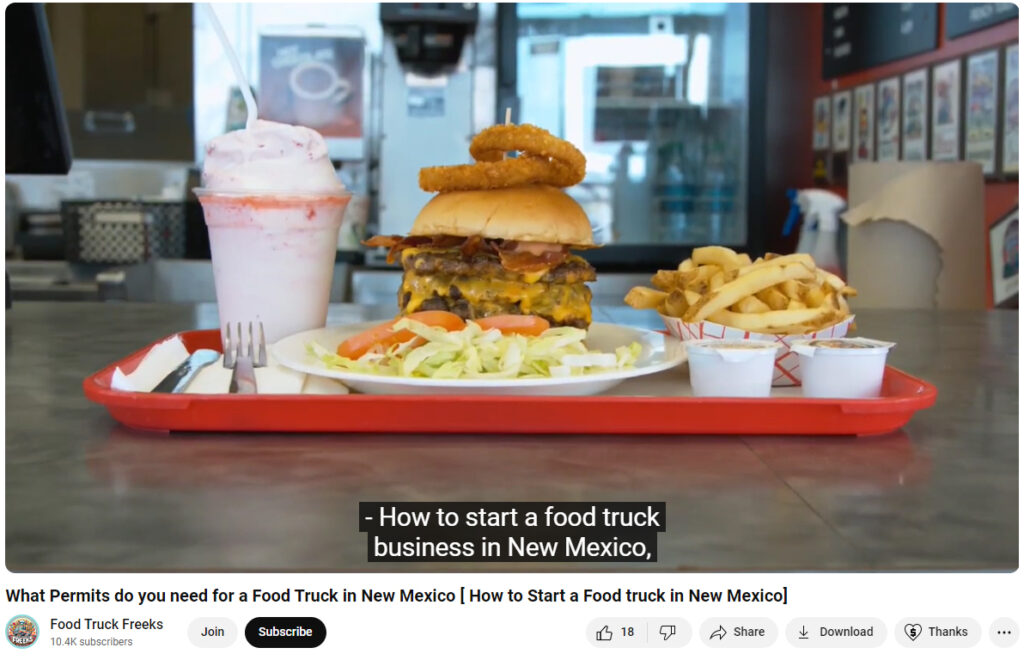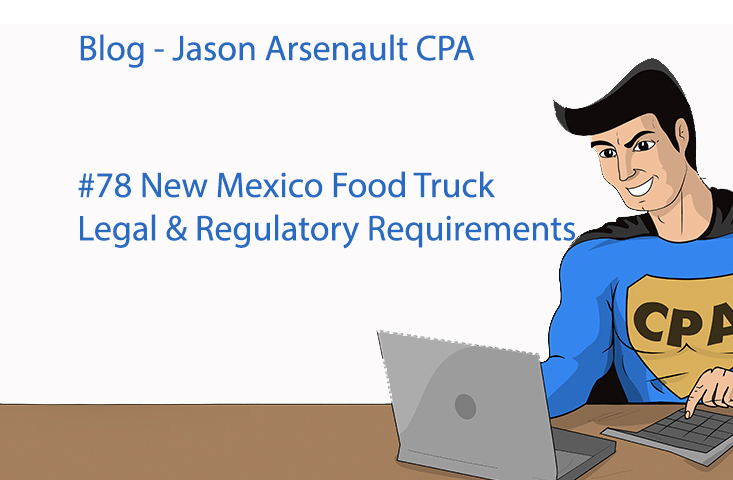Legal and Regulatory Requirements
Navigating the legal and regulatory requirements is a crucial step in starting your food truck business. This section outlines the key steps you need to take to ensure your business complies with all necessary laws and regulations in New Mexico.
Business Structure
Choose a Legal Structure:
Sole Proprietorship:
- Overview: This is the simplest and most common business structure. It involves a single owner who is personally liable for all business debts and obligations.
- Taxation: The business income and expenses are reported on the owner’s personal tax return using Schedule C.
Limited Liability Company (LLC):
- Overview: An LLC provides personal liability protection for the owner(s) and offers flexible tax options.
- Taxation Options:
- Single-Member LLC: Can file taxes as a sole proprietorship, with income and expenses reported on Schedule C.
- Multi-Member LLC: Treated as a partnership by default, with income and expenses reported on Form 1065 and then passed through to owners on a K-1.
- Election to be Taxed as an S-Corp or C-Corp: LLCs can elect to be taxed as an S-Corp, which requires filing Form 1120-S, or as a C-Corp, which requires filing Form 1120. These elections can offer different tax benefits and considerations.
Partnership:
- Overview: A partnership involves two or more people who share management and profits. There are two main types:
- General Partnership: All partners manage the business and are personally liable for business debts.
- Limited Partnership: Consists of at least one general partner (manages the business and is liable for debts) and one or more limited partners (investors with limited liability).
- Taxation: Partnerships file an annual information return (Form 1065) to report income, deductions, gains, losses, etc., and issue K-1s to partners, which are then reported on their personal tax returns.
Corporation:
- Overview: A corporation is a more complex structure with shareholders. It provides the highest level of liability protection but comes with more regulatory requirements.
- C-Corp: Subject to double taxation, where the corporation pays taxes on profits, and shareholders also pay taxes on dividends.
- S-Corp: Avoids double taxation by passing income directly to shareholders, who report it on their personal tax returns. Requires filing Form 1120-S.
Register Your Business Name:
- Name Registration: Choose a unique name for your food truck business and register it with the New Mexico Secretary of State. Ensure the name is not already in use by another business.
While these are steps you can take on your own, choosing the right business structure can be complex and have significant implications for your taxes and liability. At Jason Arsenault CPA, LLC, we are familiar with all these different structures and can help you make the best decision for your specific situation. We can also assist with registering your business with the state, ensuring everything is set up correctly from the start.
By choosing the right business structure and ensuring compliance with all legal requirements, you can lay a solid foundation for your food truck business. Let us help you navigate these crucial steps so you can focus on what you do best—serving delicious food to your customers.
Licenses and Permits
Starting a food truck business involves obtaining several licenses and permits. While this may seem daunting, each step is straightforward and manageable. It’s important to remember that these requirements are designed to ensure the safety and legality of your operations. Here’s what you need to know:
Obtain a Business License:
Local Business License:
- Overview: A business license is essential for legal operation. This license is issued by the city or county where you plan to operate.
- Process: Contact your local government offices to determine the specific requirements and steps for obtaining a business license. This typically involves filling out an application and paying a fee.
- Tip: Start this process early to avoid any delays in your launch.

Apply for a Mobile Food Vending Permit:
Mobile Food Vending Permit:
- Overview: This permit allows you to operate your food truck in public spaces. Requirements for this permit can vary depending on the location.
- Process: Check with your city or county government to understand the specific requirements. This may include providing details about your truck, planned locations, and operating hours.
- Tip: Ensure you have all necessary documentation ready, such as your business license and health permits, to streamline the application process.
Secure Health Department Permits:
Health Department Inspection:
- Overview: To ensure public safety, your food truck must meet all health and safety standards set by the New Mexico Department of Health.
- Process: Prepare for an inspection by ensuring your truck is equipped with proper food storage, preparation areas, and sanitation facilities. The health department will check that your truck complies with these standards.
- Tip: Regularly maintain and clean your equipment to meet health standards consistently.
Heath Permit:
- Overview: After passing the health inspection, you will be issued a health permit. This permit is required to legally prepare and sell food.
- Process: Submit the results of your health inspection to the New Mexico Department of Health and apply for the permit.
- Tip: Keep your health permit visible in your truck as proof of compliance.
Obtain Food Handler’s Permits:
- Food Handler’s Permit: All employees, including yourself, must have a valid food handler’s permit. This involves completing a food safety training course approved by the state.
Remember, these steps are designed to protect both you and your customers. While it may take some time to complete each requirement, they are straightforward and ensure that your business operates legally and safely.
By following these steps and securing the necessary licenses and permits, you can focus on what you do best—serving delicious food to your customers. Don’t get discouraged; with careful planning and patience, you’ll be ready to hit the streets with your new food truck.
Vehicle Requirements
Ensuring your food truck meets all necessary vehicle requirements is essential for operating legally and safely. While the process may seem detailed, each step is manageable and crucial for your success. Here’s what you need to know:
Ensure Compliance with Health and Safety Regulations:
Vehicle Standards:
- Overview: Your food truck or trailer must comply with state and local health and safety regulations. This includes having the appropriate kitchen equipment, waste disposal systems, and sanitation facilities.
- Requirements: Ensure your vehicle is equipped with items such as handwashing stations, food-grade surfaces, proper ventilation, and fire safety equipment. These standards are designed to maintain a high level of hygiene and safety.
- Tip: Keep a checklist of health and safety requirements and regularly review it to ensure your truck remains compliant.
Regular Inspections:
- Health Inspections: Be prepared for regular health inspections by the New Mexico Department of Health. These inspections ensure that your food truck continues to meet all necessary health and safety standards.
- Maintenance Inspections: Regularly inspect and maintain your equipment and vehicle to prevent breakdowns and ensure everything runs smoothly. This includes checking refrigeration units, cooking appliances, and plumbing systems.
- Tip: Schedule regular maintenance checks and keep a log of all inspections and repairs.
Register and Insure Your Vehicle:
Vehicle Registration:
- Overview: Register your food truck with the New Mexico Motor Vehicle Division (MVD). This is a legal requirement for operating your vehicle on public roads.
- Process: Complete the necessary paperwork, provide proof of ownership, and pay the registration fee. Ensure you have all required documentation, such as the vehicle’s title and proof of insurance.
- Tip: Keep your vehicle registration up to date and renew it as required to avoid penalties.
Commercial Insurance:
- Overview: Obtain commercial vehicle insurance to protect your food truck against accidents, theft, and other potential risks. This is critical for safeguarding your investment and ensuring business continuity.
- Insurance Options:
- Commercial Vehicle Insurance: Covers damages and liabilities related to your vehicle.
- General Liability Insurance: Protects against claims of bodily injury or property damage.
- Property Insurance: Covers damage or loss of your equipment and supplies.
- Workers’ Compensation: Provides coverage for medical expenses and lost wages if an employee is injured on the job.
- Tip: Shop around for insurance policies to find the best coverage at a competitive price. Consider bundling different types of insurance for better rates.
By following these steps, you can ensure that your food truck business meets all legal and regulatory requirements in New Mexico. This not only provides a solid foundation for your operations but also helps you avoid potential fines and legal issues, allowing you to focus on growing your business and serving your customers.
At Jason Arsenault CPA, LLC, we understand that navigating these requirements can be challenging. We’re here to help you through this process, ensuring your food truck business is set up for success from the start.
Contact us for assistance with your business setup:
Jason Arsenault CPA, LLC
- Phone: 505.722.3399
- Email: jason@payrollbookstaxes.com
- Website: payrollbookstaxes.com
Stay tuned for our next blog post, where we will cover Equipment and Supplies for your food truck. We’ll discuss everything from essential kitchen appliances to sourcing the best ingredients. Let us help you make your food truck dream a reality!

